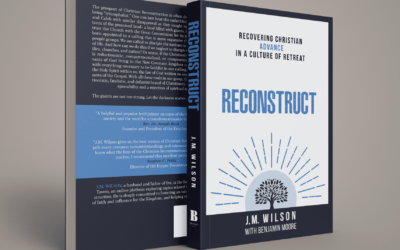The doctrines of Creation, Fall and Redemption give us a summary of what the whole Bible teaches. And not only that, but Creation, Fall and Redemption is what the whole of history is about. Everything revolves around Creation, Fall and Redemption. These doctrines constitute an interrelated complex of presuppositions that form the foundation of the biblical world-view and therefore they are to be the foundation of our own world-view; they constitute our theory of everything, that is to say they are to be the presuppositions that underpin our understanding of the whole of reality.
God created the world and he created man to serve him by exercising dominion over the earth according to his law in his name as his vicegerent (Gen. 1:26–30; 2:16–17; 9:1–11). But Adam fell into sin by disobeying God. As a consequence man’s relationship with God was broken and he became subject to death, which is God’s judgement on his sin; and because of man’s sin God also subjected the earth to a curse (Gen. 3:17). But God also promised deliverance to man, namely restoration of his relationship with God and restoration of his calling and true purpose under God.
It is clear from this that God and his will are the whole context of man’s life, whether man acknowledges this or not. And this is what the Bible teaches. God is the one in whom we “live and move and have our being” (Acts 17:28). Man was created into a relationship with God; he fell by his own sin into a broken relationship; and he is restored to a right relationship with God through the life, death and resurrection of the Lord Jesus Christ.
The fundamental and defining fact of man’s life, even though men may deny it furiously, is his relationship with God, and this relationship will be the determining fact not only of his life in this world, it will be the determining fact in his eternal destiny. And it is clear from Scripture that once man’s relationship with God is broken, man cannot restore it. The sinner is at a complete loss to put right the wrong that he has done. He cannot restore his relationship with God by means of his own efforts, because he is dead in his sins (Eph. 2:1, 5; Col. 2:13). But what is impossible with man is possible with God. If man is to be reconciled to God, restored to a right relationship with God, he must be delivered from his sin by God.
So the next question we must ask is this: how does God relate to man? If his relationship with God is the defining issue of man’s life, we need to know what that relationship is and what it means; how it is established, how it is broken and how it is restored. We need to know how God relates to man? The Bible teaches that God always relates to man by means of a covenant. Biblical religion is covenant religion. What is a covenant? A covenant is a pact, agreement or treaty between two parties. A covenant can be a pact between two equal parties, or it can be a pact between parties that are not equals, for example, between a lord and his vassal.
The Hebrew word for covenant is berith. The etymology of this word is uncertain but it probably derives either from the Hebrew verb barah, meaning to cut, then to eat and to choose, or from the Akkadian word biritu, meaning a fettering or band, from the verb baru, meaning to bind or fetter. In the ancient world of the Middle East, when two parties entered into a binding agreement, i.e. a covenant, they would slaughter an animal and cut it into two halves. The parties to the covenant would then walk between the divided animal as part of the ritual for confirming the covenant. The Hebrew term for making a covenant therefore is “to cut a covenant” (karath berith). See for example Jer. 34:18–19, where a covenant is made and confirmed by the parties passing through the divided parts of a calf, and Gen. 15:7–18 where God enters into covenant with Abraham by means of a smoking pot and blazing torch that passes between the parts of several animals that Abraham had cut into pieces and placed opposite each other. The significance of dividing an animal in two and walking between its parts is probably that if either of the parties should fail to fulfil his covenant obligations the same fate will befall him as that of the slaughtered animal.
The word berith is nearly always translated in the Septuagint, the ancient translation of the Hebrew Scriptures into Greek, by the Greek word diatheke. So, for example, in Jer. 31:31 where Jeremiah says “Behold, the days come, saith the Lord, that I will make a new covenant with the house of Israel, and with the house of Judah,” the Hebrew word berith is translated by the Greek word diatheke (chapter 38:1 in the Septuagint).
Given the importance of the covenant in the Old Testament we should expect to find the theology of the covenant in the New Testament. And indeed we do. The Greek word diatheke is also used in the New Testament to speak of the covenant. But it is not always translated as covenant in English translations of the Bible. Indeed, the term The New Testament itself is a translation of the Greek term he kaine diatheke. Of the 29 instances of the use of the term diatheke in the New Testament referenced in Abbott-Smith’s A Manual Greek Lexicon of the New Testament the Authorised Version of the English Bible translates the word 19 times as covenant, but 10 times as testament. This has led to some confusion and has blunted the significance of the theology of the covenant for the Church and for the practice of the Christian faith.
Many Christians do not accept the importance of the covenant for the practice of the Christian faith and consign it to the Old Testament, which they deem to be no longer directly relevant to the Christian life. This is an error that was all part and parcel of the Gnostic heresy that troubled the early Church and the various dualist heresies related to Gnosticism that have continued to trouble the Church throughout history, and it is a good example of how this dualist heresy still plagues the modern Church. Among some Reformed Churches the situation is certainly better, but even here there is often misunderstanding and failure to comprehend the significance of covenant theology.
It is, for example, very popular among Christians today to stress the importance of “relationships” in the Church and the need for the Church to have a “relational” understanding of the Christian faith. And there is much talk about “relationalism”; there are even organisations dedicated to promoting relationalism as the answer to man’s social problems. It would of course be entirely wrong to deny the importance of this in itself. Relationships are important in the Christian faith. Indeed, they are central and crucial. Man’s relationship with God is the defining issue of his life, and that relationship determines his relationships with his fellow men and the world around him, but the point is that the Bible deals with all man’s relationships and defines his relationship with God, with his fellow man, and with the world in which he lives in terms of the covenant.
The Bible teaches from first to last that man’s faith, life and relationships are structured covenantally. If we fail to deal with relationships covenantally, as the Bible does, we shall fail to relate to God, to each other and to the world around us as God intends us to. We shall instead define our relationships in terms of the world’s philosophy of life, in terms of secular humanism’s concept and practice of relationships. We may practise this worldly ideal of relationships in a form that is syncretised with some elements of the Christian faith, but it will not be the kind of relational practice that the covenant requires, and the results will be disastrous.
All of man’s relationships are to be structured covenantally. The covenant is the centre around which man’s life is to revolve. God does not call us to some vague worldly idea of faithfulness, he calls us to covenant faithfulness. He does not call us to obedience to some vague or worldly idea of goodness, he calls us to covenantal obedience. He does not call us to the practise of spirituality and piety as the world, and alas so often the Church, define these things, he calls us to righteousness, i.e. to do justice, as the covenant defines these things. If we do not structure our relationships covenantally, we fail to relate properly, i.e. as God intends us to relate to each other.
It is the lack of this understanding of the essentially covenantal nature of man’s relationships that characterises so much of the modern talk and practice among Christians about relationships. We hear the talk about relationships all the time among Churches and Christians, but seldom is this understood or practised in terms of the covenant, and that is why so much of what passes for Christianity today differs so little from the life of the world. The Church imbibes the world’s attitudes to these things and gives them a superficial Christian veneer instead of subjecting her understanding and practice of the faith to the covenant.
Relationships are certainly important in the Christian faith, indeed they are at the heart of the Christian faith, but all these relationships are defined and structured by the covenant. It is utterly misleading and erroneous for Christians to talk about the importance of relationships and the need for a better “relational” understanding of the faith and of life while at the same time neglecting the essentially covenantal nature of all these relationships that the Bible sets before us. But this is what we have had. We need, therefore, to gain a better understanding of the covenant and how it structures the Christian faith and therefore the Christian life, since it applies to every aspect of our lives and to all our relationships, as families, communities, societies and even as nations.
We have seen that a covenant is a pact or agreement between two parties and that it is confirmed by a blood sacrifice that binds the parties together. We have also seen that a covenant can be between equals or between parties that are not equal. In the biblical covenants between God and man, the parties are obviously not equals. The biblical covenants between God and man are between a sovereign Lord and his subjects. The biblical concept of the covenant between God and man in which God redeems his people from their sin under the covenant of grace has been defined by O. Palmer Robertson as “a bond in blood sovereignly administered.” A covenant consists essentially of three parts:
- The parties to the covenant,
- The terms or conditions of the covenant, and
- The sanctions, i.e. the blessings and curses promised by the covenant.
A popular version of the covenant among some American writers in recent years has been a five point covenant model that includes Sovereignty/Representation and Inheritance/Future as separate main points of a covenant. Although each of these points is valid and included in the biblical covenants, sovereignty more properly comes under Parties, while Representation comes partly under Parties and partly under Terms or Conditions, and Inheritance/Future is really part of Sanctions.
1. The parties to the biblical covenants are on the one side God, as the sovereign Lord, and on the other, man as his creation. The book of Exodus says “And I will take you to me for a people, and I will be to you a God; and ye shall know that I am the Lord your God, which bringeth you out from under the burdens of the Egyptians” (Ex. 6:7). Likewise the book of Leviticus says “And I will walk among you, and will be your God, and ye shall be my people” (Lev. 26:12; see also Jer. 7:23; 11:4; 30:22; Ezek. 11:20; 36:28).
It is important to understand, however, that the covenant is part of the fabric of man’s creation. The covenant is not an afterthought on God’s part. God did not create man and then afterwards decided he would relate to him by means of covenant. Man was created from the beginning as a covenantal being. He was created to be in covenant with God. Man does not come to God as a free agent and make a covenant with God as an equal, on his own terms. He comes as God’s creation, bound by his Creator to serve him according to his will. That is what he was created for.
The covenant is not an option for man. It is part of the nature of his being. Man’s creation establishes him as a covenant being. Man is either a covenant keeper or a covenant breaker, but his relationship to God is always covenantal and he cannot escape the covenantal nature of his existence. The covenant establishes that God will be the God and Saviour of his people and that his people will worship him, i.e. serve or work for him, in obedience to the terms of the covenant. But this agreement is not something that man chooses to enter into by means of a process of deliberation and bargaining with God. The covenant defines who and what man is from his creation, i.e. he is defined by the covenant as a worshipping creature, that is to say a creature whose purpose is to serve God, in other words one whose calling is to work for God on earth as his vicegerent in what we call the Cultural or Creation Mandate.
- The terms or conditions of the covenant, by which man is bound to God as his servant, is God’s law. The sovereign Lord promises to be God to man, to be his saviour and protector and man, in response to this, is obligated to keep God’s laws, which are the terms or conditions of the covenant. So Jeremiah says “But this thing commanded I [i.e. God] them, saying, Obey my voice, and I will be your God, and ye shall be my people: and walk ye in all the ways that I have commanded you, that it may be well unto you” (Jer. 7:23).
3. The sanctions of the covenant are the blessings that God bestows upon his people as they obey his law and serve him according to his word, and the curses that will come upon them if they are faithless and abandon their obligation to serve him and keep his law.
So for example, we are told in Deuteronomy 28 : “And it shall come to pass, if thou shalt hearken diligently unto the voice of the Lord thy God, to observe and do all his commandments which I command thee this day, that the Lord thy God will set thee on high above all the nations of the earth; And all these blessings shall come upon thee, and over take thee, if thou shalt hearken unto the voice of the Lord thy God” (Dt. 28:1–2). There then follows a list of all the blessings promised to the people if they are faithful to the covenant. Then at v. 15 we read: “But it shall come to pass, if thou wilt not hearken unto the voice of the Lord thy God, to observe to do all his commandments and his statutes which I command thee this day; that all these curses shall come upon thee, and overtake thee” (Dt. 18:15). There then follows a list of the curses that will come upon a people that abandons the covenant and refuses to keep faith with God by living according to his word (see also Ex. 26:3–39).
There are two covenants between God and man in the Bible. The first is the covenant of works, or the covenant of Creation or nature, in which man stands before God on the basis of his own righteousness, and the other is the covenant of grace, in which man stands before God not in his own person but in the person of another and on the basis of another’s righteousness, an alien righteousness as Luther called it, redeemed from his sin by the work of the Lord Jesus Christ. All men are under one of these covenants, whether or not they like it or understand it. You cannot be under both of these covenants. You are either under the covenant of works, and condemned as a breaker of God’s law, a sinner, or you are under the covenant of grace, and redeemed from your sin by the Lord Jesus Christ.
This brings us to a point that was mentioned earlier, representation. The covenant of works was made with Adam as the representative of the human race in the Garden of Eden. Adam as the father of the human race represented his posterity in the covenant. He was what is called the federal head of humanity in the state of nature. When he fell into sin the whole of the human race fell with him, and so, as Paul says, “as by one man sin entered into the world, and death by sin; and so death passed upon all men, for that all have sinned (Rom. 5:12).
The covenant of redemption is made between God the Father and God the Son, the second person of the Trinity, who is appointed as the redeemer of God’s elect and accomplishes their salvation by means of his incarnation in the Lord Jesus Christ as the federal head of a new humanity, in whom all those who are united with him by faith are delivered from their sin by virtue of his life, death and resurrection on their behalf. Those who through faith look to Jesus Christ for deliverance from the condemnation that falls upon all men as a consequence of their sin, are no longer under the covenant of works, but are under the covenant of grace, since God accepts them as righteous in his sight on the basis of the righteousness of Jesus Christ. They therefore stand before God in the person of another, Jesus Christ, and through being united with him by faith are delivered from condemnation for sin.
When Christ died on the cross he took upon himself, as their federal head and representative, all the punishment for the sins of those who believe in him. So mankind is always represented before God by one of two heads: Adam, who fell into sin and brought condemnation and death upon all mankind, or Christ, who redeemed from sin and brought new life to all those who put their faith in him, thereby restoring their broken relationship with God under a covenant of grace. In the covenant of works man stands before God in Adam as a covenant breaker and under condemnation for his sin; in the covenant of grace man stands before God in Christ as someone who is redeemed from his sin and therefore whose covenantal relationship with God is restored in Christ.
Through faith in Christ we enter into a new covenantal relationship with God, one not based on our own righteousness (the covenant of works), but based on the righteousness of Jesus Christ (the covenant of grace). So the apostle Paul goes on to say: “For as by one man’s disobedience many were made sinners, so by the obedience of one shall many be made righteous. Moreover the law entered, that the offence might abound. But where sin abounded, grace did much more abound: That as sin hath reigned unto death, even so might grace reign through righteousness unto eternal life by Jesus Christ our Lord” (Rom. 5:19–21).
——————
This article is a shortened version of a much longer and more detailed essay that was published as A Brief Introduction to Covenant Theology in two parts on the Christian Renaissance Media website here:
Part I. What is the Covenant ?
Part II. The Covenant of Works and the Covenant of Grace






0 Comments